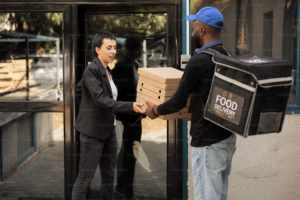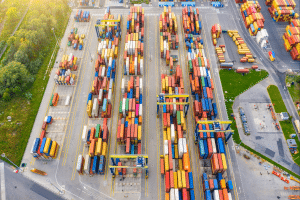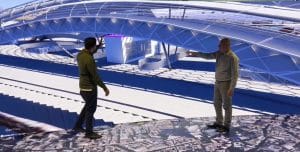Geospatial is at the core of enhancing efficiency, equity, and addressing key global challenges.
The role of collaborations for value-creation, innovation, and market outreach cannot be overstated. By coming together, organisations and nations not just deliver targeted services and impactful solutions, but contribute to robust socio-economic growth.
At the first plenary of Geospatial World Forum 2024 in Rotterdam, a diverse panel discussed the role of strategic partnerships.
Sanjay Kumar, CEO, Geospatial World set the tone by reiterating his commitment towards Sustainability of Everything, which is not just about climate mitigation and energy transition, but focuses on inclusivity, diversity, and participation of everyone in the ecosystem.
Kernel of Hope
“Sustainability begin by viewing the world as a single ecosystem because everything is inter-linked”, believes Dean Angelides, Corporate Director, Esri.
“We are living beyond our means in many different ways. We have choices to act on how we work and act together”, he muses.
“GIS is a powerful platform for creating, understanding, exploring alternatives, and finding solutions”. Distributed GIS is becoming a system-of-systems, unveiling greater opportunities for everyone.
Enabling Development
Geospatial knowledge Infrastructure is the evolution of what was earlier called NSDI(National Spatial Data Infrastructure). This posits an opportunity to create an open and innovative ecosystem accessible to all.
Geospatial Information is absolutely critical at the local level and plays an increasing role for the industry in volume, investment, and transition”, says Stefan Schweinfest, Director, United Nations Statistics Division.
“It is a key driver for development. Technology makes all of it possible but we need to remember responsible usage of it”, he adds.
Ron Jermin, Deputy Director, US Census Bureau, shares crucial insights on how geospatial data helps communities in gaining knowledge as well as ensuring connectivity and gaining deep divides.
Decision Support
Transitioning to a vibrant new-age economy, Kingdom of Saudi Arabia is extensively focussing on building partnerships in the geospatial domain. A centre for capacity development would soon be hosted in Riyadh.
“We believe in the important role of geospatial information to support decision-making for economic growth”, says Mohammed Yahya Alsayel, President, General Authority for Survey and Geospatial Information (GEOSA), Saudi Arabia.
“Our four pillars are agile strategy, sustainable governance, enduring technology, and evolving capacity building”, he adds.









